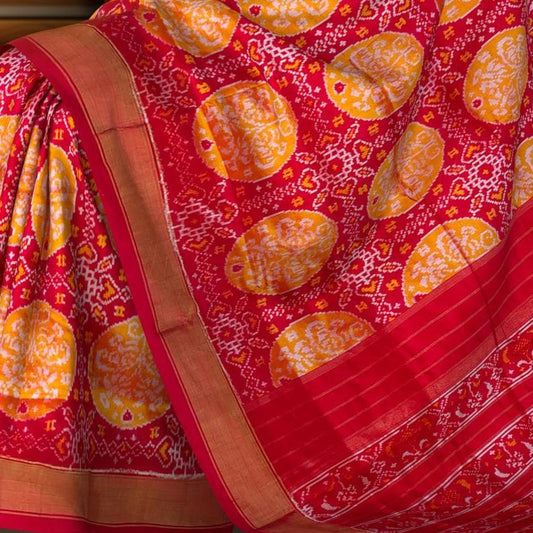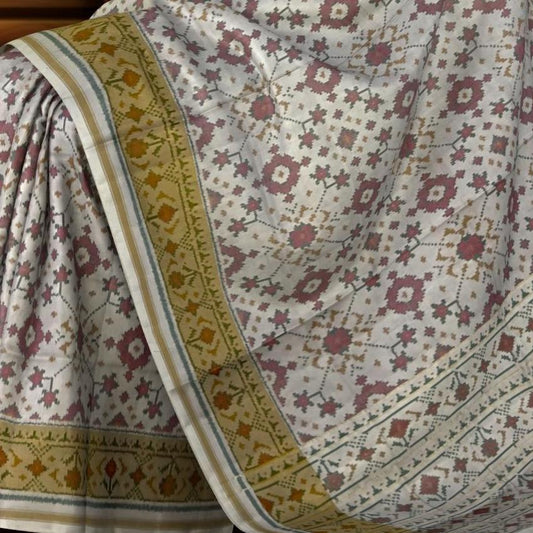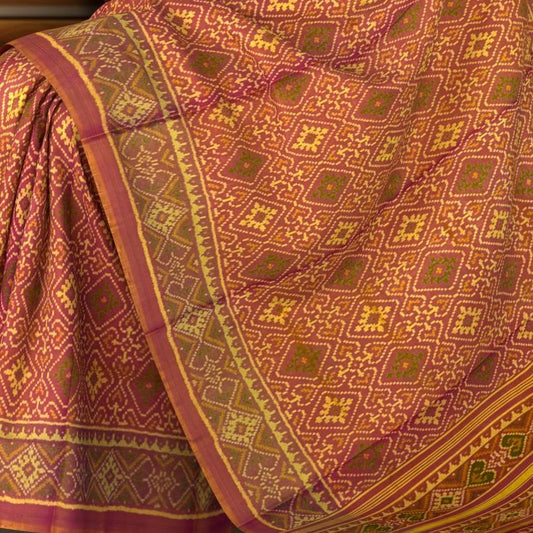Empowering Patola Weavers: Government, NGO, and Global Initiatives
Patola sarees, with their intricate designs and vibrant colors, represent the rich cultural heritage of India. However, the traditional art of Patola weaving faces numerous challenges, including competition from machine-made textiles, dwindling numbers of skilled weavers, and a lack of awareness among younger generations. To address these issues, various initiatives have been launched by the government, NGOs, private sectors, and global organizations. This blog delves into these initiatives aimed at preserving and promoting Patola weaving, ensuring that this exquisite craft continues to thrive.
Government Schemes and Support for Patola Weavers
The Indian government has implemented several schemes and programs to support Patola weavers, ensuring they receive the necessary resources and recognition to sustain their craft.
1. Handloom Mark Scheme
The Handloom Mark Scheme is an initiative by the Ministry of Textiles to authenticate handloom products, including Patola sarees. This scheme helps consumers identify genuine handloom products, ensuring weavers get fair prices for their authentic work. The scheme not only protects the weavers from the influx of counterfeit products but also promotes the unique identity of Patola weaving.
2. National Handloom Development Programme (NHDP)
The NHDP aims to improve the socio-economic conditions of handloom weavers by providing them with training, infrastructure, and market support. Under this program, weavers receive training in modern weaving techniques and design development, enhancing their skills and product quality. Additionally, the scheme provides financial assistance for setting up common infrastructure facilities like dyeing units and weaving centers.
3. Integrated Handloom Cluster Development Scheme (IHCDS)
The IHCDS focuses on creating handloom clusters, bringing together groups of weavers to work collectively. This scheme facilitates the provision of raw materials, credit facilities, and market linkages. By working in clusters, Patola weavers can benefit from shared resources and increased bargaining power, leading to better income and improved living standards.
4. Weaver MUDRA Scheme
The Weaver MUDRA Scheme provides financial assistance to handloom weavers through MUDRA loans. These loans offer affordable credit to weavers for purchasing raw materials, upgrading looms, and other essential requirements. This financial support enables weavers to scale up their production, improve the quality of their products, and expand their market reach.
NGO and Private Sector Initiatives
Non-governmental organizations (NGOs) and private sector companies play a crucial role in supporting Patola weavers through various initiatives focused on skill development, financial assistance, and market access.
1. SEWA (Self-Employed Women's Association)
SEWA is an organization dedicated to empowering women in the informal sector, including Patola weavers. SEWA provides training in weaving techniques, design innovation, and entrepreneurship, enabling weavers to enhance their skills and create marketable products. Additionally, SEWA facilitates access to microfinance, helping weavers secure the necessary funds to sustain their businesses.
2. Fabindia's Artisan Support Program
Fabindia, a well-known retailer of handloom products, has an Artisan Support Program aimed at promoting traditional crafts, including Patola weaving. The program provides weavers with direct market access, eliminating intermediaries and ensuring fair compensation. Fabindia also invests in the development of sustainable practices and quality improvement, ensuring that the art of Patola weaving is preserved for future generations.
3. Dastkar's Craft Revival Projects
Dastkar, an NGO working for the revival of traditional crafts, has undertaken several projects to support Patola weavers. These projects focus on skill development, design innovation, and market linkages. Dastkar organizes craft fairs and exhibitions, providing a platform for weavers to showcase and sell their products directly to consumers, thereby increasing their income and market exposure.
Global Campaigns and Awareness Programs
Global campaigns and awareness programs have significantly contributed to the promotion and preservation of Patola weaving by highlighting its cultural significance and promoting ethical consumption.
1. UNESCO's Recognition of Patola Weaving
UNESCO's recognition of Patola weaving as an Intangible Cultural Heritage has brought international attention to this traditional craft. This recognition not only validates the cultural importance of Patola weaving but also encourages global efforts to preserve and promote it. The UNESCO tag has helped attract tourists and buyers from around the world, creating new markets for Patola products.
2. Slow Fashion Movement
The slow fashion movement, which advocates for sustainable and ethical fashion, has provided a significant boost to traditional crafts like Patola weaving. This movement encourages consumers to value quality over quantity, promoting handwoven products that have a lower environmental impact. By raising awareness about the benefits of sustainable fashion, the slow fashion movement has helped create a niche market for Patola sarees among conscious consumers.
3. International Handloom Day Celebrations
International Handloom Day, celebrated on August 7th each year, aims to promote handloom products globally. Various events and exhibitions are organized to showcase traditional handloom crafts, including Patola weaving. These celebrations provide a platform for weavers to connect with international buyers, expand their market reach, and gain global recognition for their craftsmanship.
Conclusion
The initiatives by the government, NGOs, private sector, and global organizations play a pivotal role in preserving and promoting Patola weaving. By providing financial assistance, skill development, market access, and international recognition, these efforts ensure that Patola weavers can continue their craft sustainably. The collective support from these initiatives not only helps in preserving the cultural heritage of Patola weaving but also empowers the weavers, enabling them to thrive in a competitive market. Through continued efforts and awareness, the rich tradition of Patola weaving can be safeguarded for future generations, ensuring that this exquisite art form continues to enchant and inspire the world.






